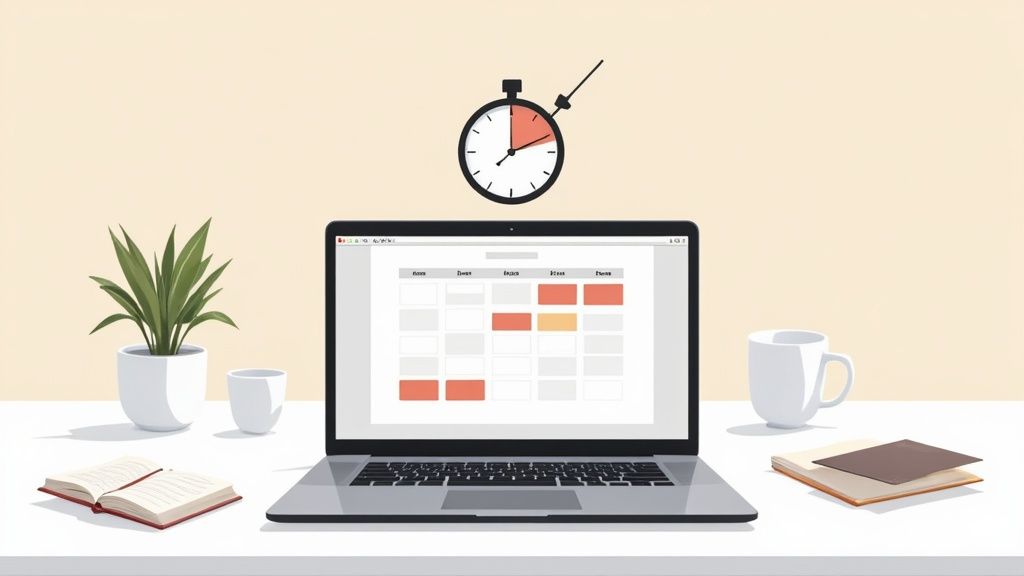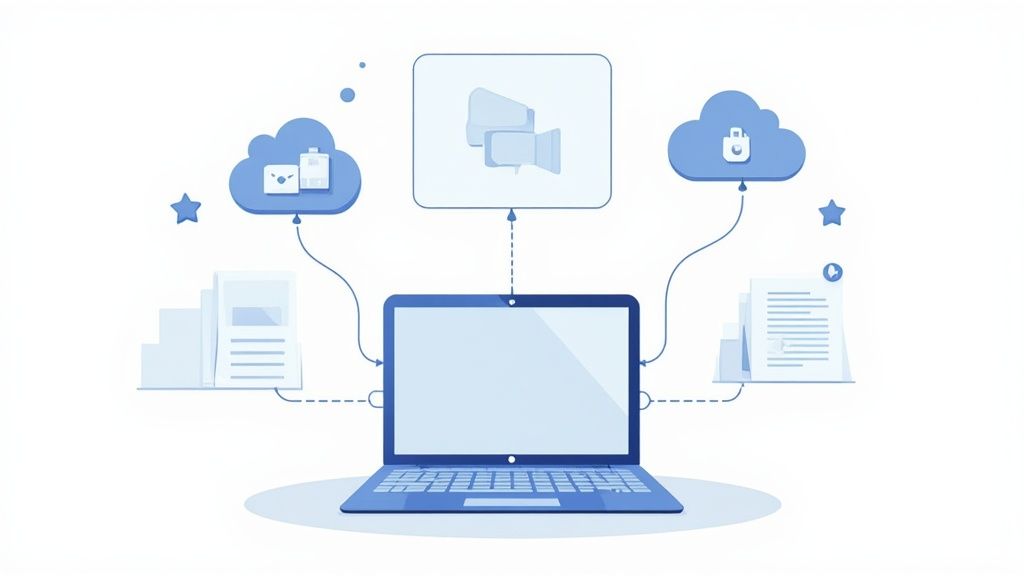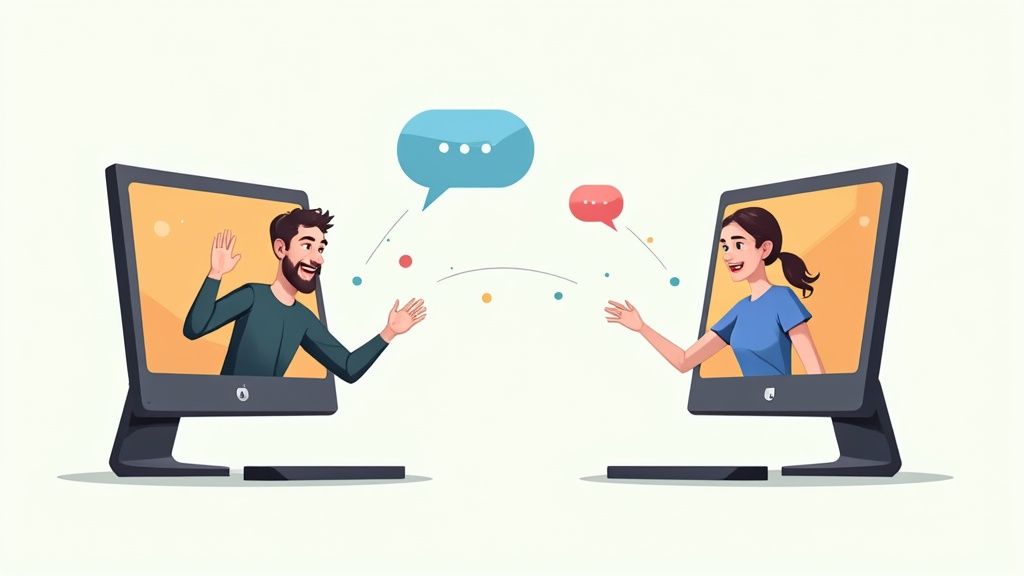
Remote Job Interview Questions: Top Tips & Answers 2025
Published
Landing Your Dream Remote Role: Mastering the Interview
Securing a remote job requires more than just traditional interview skills. You must demonstrate your ability to thrive in a virtual work environment. This comprehensive list tackles the most common remote job interview questions, providing actionable insights to help you craft compelling responses. Understanding how to answer these questions effectively is crucial for showcasing your remote work capabilities and landing your dream role. This guide offers expert tips and strategies to highlight your experience and skills, setting you apart from other candidates. We'll cover key areas like time management, communication, remote collaboration tools, and maintaining work-life balance. Whether you're an experienced remote worker or new to the virtual landscape, mastering these questions will significantly increase your chances of success. We'll delve into specific examples, practical advice, and unique approaches to help you confidently navigate your next remote job interview. Prepare to impress hiring managers and stand out in the competitive remote job market. Learn how to effectively communicate your value and secure your ideal remote position. This listicle will cover the following crucial remote job interview questions:
- How do you manage your time and stay productive while working remotely?
- Describe your experience with remote collaboration tools and technologies.
- How do you handle communication and stay connected with team members in a remote environment?
- What challenges have you faced while working remotely, and how did you overcome them?
- How do you create boundaries between work and personal life when working from home?
- Describe a time when you had to work independently on a project with minimal supervision.
- How do you stay motivated and engaged when working alone for extended periods?
- What is your home office setup, and how do you ensure a professional work environment?
1. How do you manage your time and stay productive while working remotely?
This question is a staple in remote job interviews. It's designed to assess your self-discipline, organizational skills, and ability to maintain productivity without direct supervision. Hiring managers want to understand how you handle the unique challenges of remote work and what strategies you employ to overcome them. Your answer reveals whether you can thrive in a remote environment. Demonstrating a proactive approach to time management and productivity is crucial for securing the role.

A strong answer goes beyond generic statements. It demonstrates a clear understanding of personal productivity techniques and their practical application. It also signals your ability to integrate these practices into a consistent routine. Learn more about... how to address this key question effectively.
Examples of Effective Time Management Strategies
- Time-blocking: Scheduling specific blocks of time for different tasks using calendar apps helps allocate time effectively.
- Dedicated Workspace: A designated workspace minimizes distractions and promotes a focused work environment.
- Pomodoro Technique: Working in focused intervals with short breaks can enhance concentration and prevent burnout.
- Clear Boundaries: Setting clear boundaries between work and personal life is essential for maintaining work-life balance.
Actionable Tips for Answering This Question
- Be Specific: Mention specific tools and techniques you use, like Trello for project management or Slack for communication.
- Describe Your Workspace: Briefly describe your workspace setup and how it contributes to your productivity. Mentioning ergonomic considerations or noise-cancelling headphones shows you take your work environment seriously.
- Quantify Your Results: If possible, share metrics or results that demonstrate the effectiveness of your time management strategies. For instance, mention an increase in completed tasks or improved project turnaround times since implementing a new technique.
- Address Work-Life Balance: Acknowledge the importance of work-life balance. Explain how your strategies help you maintain it, showcasing your ability to disconnect after work hours. This reassures potential employers that you won't be burning out.
This question is an opportunity to highlight your proactive approach to remote work. Showcase your understanding of the challenges and your ability to create a productive and sustainable work routine. By providing specific examples and quantifiable results, you'll demonstrate your preparedness to thrive in a remote role.
2. Describe your experience with remote collaboration tools and technologies
This question evaluates a candidate's technical proficiency with digital collaboration platforms and their ability to adapt to new technologies. It's crucial for determining if they can effectively participate in virtual team environments and contribute seamlessly to projects. Hiring managers want to know you're not just familiar with these tools, but can leverage them effectively to achieve team goals. Demonstrating a strong grasp of these technologies is often a key factor in securing a remote position.

A strong answer goes beyond simply listing tools. It articulates how you've utilized these platforms to achieve specific outcomes in previous roles. It also indicates your adaptability and willingness to learn new technologies as needed. Showcasing your ability to navigate the digital landscape of remote work is essential for impressing potential employers.
Examples of Effective Collaboration Tools
- Communication: Slack, Microsoft Teams, Discord
- Video Conferencing: Zoom, Google Meet, WebEx
- Project Management: Asana, Trello, Monday.com
- File Sharing: Google Drive, Dropbox
Actionable Tips for Answering This Question
- Mention Specific Platforms: Detail your experience with specific platforms, highlighting your proficiency and any specialized skills. For example, mention creating custom workflows in Asana or utilizing advanced features in Slack.
- Describe Problem-Solving: Share examples of how you've used these tools to overcome technical challenges or improve team communication. Perhaps you streamlined a workflow using Trello or resolved a communication bottleneck by implementing a new channel strategy in Slack.
- Show Willingness to Learn: Express your openness to learning new tools and adapting to different technological environments. The remote work landscape is constantly evolving, so demonstrating adaptability is key.
- Discuss Collaboration Styles: Discuss your experience with both synchronous and asynchronous collaboration, showcasing your understanding of different remote work styles. This demonstrates your flexibility and ability to contribute effectively in various team setups.
This question presents an opportunity to highlight your technical capabilities and adaptability in the context of remote work. By showcasing your experience with relevant platforms and your proactive approach to digital collaboration, you'll significantly strengthen your candidacy for remote roles.
3. How do you handle communication and stay connected with team members in a remote environment?
This question examines a candidate's communication skills, proactive approach to team engagement, and strategies for maintaining relationships without face-to-face interaction. Hiring managers want to gauge your ability to communicate effectively and build rapport in a virtual setting. Your answer reveals your understanding of remote communication nuances and your ability to navigate them successfully. Demonstrating proactive communication and relationship-building skills is crucial for roles requiring strong team collaboration.

A strong answer goes beyond simply listing communication tools. It showcases your understanding of different communication styles and your adaptability in using various platforms effectively. It also highlights your proactive efforts to foster team cohesion and build relationships in a remote environment.
Examples of Effective Remote Communication Strategies
- Regular Check-ins: Scheduling short, regular video calls with team members helps maintain connection and address any immediate concerns.
- Team Chat Channels: Utilizing team chat platforms like Slack or Microsoft Teams for ongoing communication fosters a sense of community and facilitates quick information sharing.
- Virtual Coffee Breaks: Participating in virtual coffee breaks or team-building activities helps build rapport and strengthen team bonds.
- Over-communication: Proactively sharing project updates and progress, even seemingly minor details, keeps everyone informed and minimizes misunderstandings.
Actionable Tips for Answering This Question
- Emphasize Proactive Communication: Highlight your proactive approach to communication, such as initiating regular check-ins or offering assistance to colleagues.
- Mention Specific Communication Frequencies: Detail how often you communicate with team members using different channels, demonstrating a structured approach to remote communication.
- Discuss Building Rapport Remotely: Share examples of how you build and maintain relationships with remote colleagues, showcasing your ability to connect with others in a virtual environment.
- Address Different Communication Styles: Acknowledge the importance of adapting your communication style to accommodate different preferences. Mention your ability to communicate clearly and concisely through various mediums, like email, instant messaging, and video conferencing.
This question presents an opportunity to highlight your communication prowess and your ability to thrive in a remote team environment. By providing specific examples and demonstrating your understanding of effective remote communication strategies, you can reassure potential employers of your ability to stay connected and collaborate effectively in a virtual setting.
4. What challenges have you faced while working remotely, and how did you overcome them?
This behavioral question uncovers a candidate's problem-solving abilities, resilience, and practical experience with remote work obstacles. It reveals their self-awareness and capacity for continuous improvement in a remote setting. Hiring managers use this question to gauge how you handle unexpected situations and adapt to the inherent challenges of remote work. Demonstrating your ability to overcome obstacles effectively is essential for securing the role.

A strong answer goes beyond simply listing challenges. It showcases your analytical thinking and proactive approach to finding solutions. It also highlights your ability to learn from these experiences and adapt your strategies accordingly. Learn more about... how to navigate remote job interviews.
Examples of Common Remote Work Challenges and Solutions
- Overcoming Isolation: Joining online communities or virtual networking events combats feelings of isolation and builds professional connections.
- Solving Internet Connectivity Issues: Developing backup plans, such as a mobile hotspot or alternative workspace, ensures continued productivity during outages.
- Managing Distractions: Creating a dedicated workspace and setting clear boundaries minimizes distractions and enhances focus.
- Addressing Miscommunication: Implementing clearer communication protocols and using collaborative tools reduces misunderstandings and streamlines teamwork.
Actionable Tips for Answering This Question
- Use the STAR Method: Structure your answer using the STAR method (Situation, Task, Action, Result) to provide a clear and concise narrative of the challenge, your actions, and the positive outcome.
- Focus on Professional Challenges: Concentrate on challenges directly related to your professional work, rather than personal or domestic issues.
- Emphasize Positive Outcomes and Lessons Learned: Highlight the positive results of your actions and the lessons you learned from the experience. This demonstrates growth and adaptability.
- Show Continuous Improvement Mindset: Frame your answer to showcase a continuous improvement mindset, demonstrating your willingness to adapt and refine your approaches to remote work.
This question presents an opportunity to demonstrate your resourcefulness and resilience in the face of remote work challenges. By providing specific examples and emphasizing positive outcomes, you can convince hiring managers of your ability to thrive in a remote environment.
5. How do you create boundaries between work and personal life when working from home?
This question assesses a candidate's ability to maintain work-life balance, prevent burnout, and sustain long-term productivity. It's particularly important for remote roles where the lines between work and personal life can easily blur. Hiring managers want to know you're capable of self-managing and prioritizing your well-being while delivering results. Demonstrating a clear understanding of boundary setting is key to securing a remote position. Your answer reveals whether you can thrive in a remote environment without sacrificing your personal life. This is a critical factor for long-term success in remote job interview questions.
A strong answer goes beyond simply stating you have boundaries. It details the specific strategies you employ to create separation between work and personal time. It also signals your understanding of the potential pitfalls of remote work and your proactive approach to mitigating them.
Examples of Effective Boundary-Setting Strategies
- Dedicated Workspace: A designated office space creates a physical separation between work and relaxation.
- Scheduled Work Hours: Setting specific start and end times helps prevent work from bleeding into personal time.
- Separate Devices/Accounts: Using different devices or accounts for work and personal tasks reinforces boundaries.
- End-of-Workday Rituals: A routine like shutting down your computer and going for a walk signals the end of the workday.
Actionable Tips for Answering This Question
- Be Specific: Detail your routines and strategies, showcasing your intentional approach to boundary setting. For example, mention using a specific app to track work hours or a physical act like closing your office door at the end of the day.
- Address Flexibility: Acknowledge the need for flexibility in remote work, but emphasize how you maintain boundaries even during unexpected situations. This shows you can adapt while prioritizing work-life balance.
- Mention Both Physical and Mental Boundaries: Describe both physical strategies (separate workspace) and mental techniques (mindfulness or meditation after work) you use to disconnect.
- Connect to Burnout Prevention: Explain how your boundaries help prevent burnout, demonstrating an understanding of the importance of well-being for sustained productivity. This reassures employers that you can manage the demands of remote work without sacrificing your health.
This question is a chance to demonstrate your self-awareness and commitment to a healthy work-life integration. By providing specific examples and showcasing your understanding of the nuances of remote work, you'll demonstrate your readiness to thrive in a remote role while maintaining your well-being.
6. Describe a time when you had to work independently on a project with minimal supervision
This behavioral question, frequently asked in remote job interview questions, assesses your self-motivation, initiative, and ability to deliver results without constant guidance. It's crucial for remote positions where managers can't provide immediate oversight. Hiring managers want to gauge your ability to thrive in an autonomous environment and take ownership of your work. Your answer reveals your comfort level with independent work and your capacity to manage projects effectively. Demonstrating initiative and resourcefulness is key to securing a remote role.
A strong answer goes beyond simply describing a solo project. It showcases your proactive problem-solving skills, decision-making abilities, and commitment to achieving results. It also signals your ability to communicate effectively even without constant interaction.
Examples of Independent Projects
- Leading a Research Project: Managing a complex research project with infrequent check-ins demonstrates independent work capabilities.
- Developing a New Process: Creating a new system or process from scratch highlights initiative and problem-solving skills.
- Managing a Client Relationship: Handling a client relationship with minimal supervision demonstrates trust and autonomy.
- Creating Training Materials: Developing training documentation autonomously showcases organizational and instructional design skills.
Actionable Tips for Answering This Question
- Choose a Relevant Example: Select a project that aligns with the specific requirements of the remote job you’re interviewing for.
- Highlight the Outcomes: Focus on the positive results you achieved while working independently. Quantify your achievements whenever possible. For example, mention a specific percentage increase in efficiency or cost savings resulting from your project.
- Describe Your Process: Explain your approach to managing the project, including how you set goals, prioritized tasks, and tracked progress. This demonstrates your organizational skills.
- Discuss Challenges and Solutions: Mention any obstacles you encountered while working independently and explain how you overcame them. This highlights your resourcefulness and problem-solving abilities.
- Emphasize Communication: Briefly describe how you maintained communication with stakeholders and ensured everyone was informed of your progress, even without constant supervision. This demonstrates your proactive communication skills.
This question is an opportunity to shine a light on your ability to thrive in a remote work environment. Showcase your self-sufficiency, initiative, and commitment to delivering exceptional results, even when working independently. By providing concrete examples and quantifiable outcomes, you'll demonstrate your readiness to excel in a remote role. Mastering this common remote job interview question significantly strengthens your candidacy.
7. How do you stay motivated and engaged when working alone for extended periods?
This question explores a candidate's intrinsic motivation, self-awareness regarding their work preferences, and strategies for maintaining enthusiasm without the energy of a physical office environment. Hiring managers use this question to gauge a candidate's suitability for long-term remote work success. They want to see if you possess the self-discipline and drive to perform consistently without direct supervision. Your answer will reveal your ability to thrive in an independent work setting.
A strong answer demonstrates a proactive approach to maintaining motivation and engagement. It showcases your understanding of potential challenges and your ability to implement effective strategies. This question is crucial for assessing your long-term fit for a remote role. Learn more about... how to stay motivated and engaged when working alone.
Examples of Effective Motivation Strategies
- Setting Personal Goals: Establishing clear, achievable goals provides a sense of purpose and direction. Celebrating milestones, no matter how small, reinforces positive work habits.
- Varied Work Locations: Changing your work environment occasionally can boost creativity and prevent monotony. Working from a coffee shop or co-working space can provide a refreshing change of pace.
- Background Stimulation: Listening to music or podcasts during routine tasks can enhance focus and maintain energy levels. Choose audio that complements your work style and doesn't distract you.
- Regular Connection: Connecting with colleagues or industry peers through virtual coffee chats or online communities combats isolation and fosters a sense of belonging.
Actionable Tips for Answering This Question
- Share Specific Strategies: Discuss proven techniques you've used successfully to maintain motivation in the past. Provide concrete examples of how these methods have benefited your work.
- Address Long-Term and Short-Term Motivation: Describe both your daily practices and your broader strategies for long-term engagement. This demonstrates a holistic approach to motivation.
- Discuss Motivation Dips: Acknowledge that motivation can fluctuate. Explain how you recognize and address periods of lower motivation, showcasing your self-awareness and problem-solving skills.
- Highlight Work Style Preferences: Connect your motivation strategies to your preferred work style. Explain how your approach aligns with your individual needs and contributes to your overall productivity.
This question offers an opportunity to demonstrate your understanding of the unique challenges of remote work and your ability to create a sustainable and engaging work routine. By providing specific examples and demonstrating self-awareness, you can reassure potential employers of your capacity to thrive in a remote role.
8. What is your home office setup, and how do you ensure a professional work environment?
This question assesses a candidate's preparation for remote work. It explores their understanding of professional standards in a home environment and their ability to create conditions conducive to productivity and professional interactions. Hiring managers want to know you can maintain a professional image and work effectively outside a traditional office. Your answer reveals your commitment to remote work as a viable long-term solution. Demonstrating a well-equipped and thoughtfully organized workspace can significantly boost your chances.
A strong answer goes beyond simply listing equipment. It showcases your proactive approach to creating a dedicated, functional, and professional workspace. It also conveys your understanding of the importance of minimizing distractions and maintaining a professional image during virtual meetings.
Examples of a Professional Home Office Setup
- Dedicated Workspace: A separate room or designated area minimizes interruptions and promotes focus.
- Ergonomic Setup: A proper desk, chair, and monitor arrangement prioritizes comfort and long-term health, vital for sustained productivity.
- High-Quality Tech: Reliable internet, a good webcam, and a noise-canceling headset ensure seamless communication and a professional online presence.
- Organized and Clutter-Free Environment: A tidy workspace promotes clarity and professionalism during video calls.
Actionable Tips for Answering This Question
- Describe Your Setup: Detail your workspace, highlighting ergonomic considerations and equipment choices that contribute to productivity.
- Address Distractions: Explain how you minimize distractions, whether it's using noise-canceling headphones or establishing quiet hours with family members.
- Highlight Professionalism: Discuss how your setup supports professional virtual interactions, including a neutral background and appropriate lighting.
- Mention Backup Plans: Addressing potential tech issues, like having a backup internet connection, shows foresight and preparedness.
- Connect to Remote Work Success: Briefly explain how your setup has contributed to your success in previous remote roles, demonstrating tangible benefits.
This question offers a valuable opportunity to showcase your commitment to remote work. By describing a well-equipped and professionally maintained home office, you demonstrate your readiness to thrive in a remote environment and contribute effectively to the team.
Remote Interview Questions Comparison Table
| Question / Topic | Implementation Complexity 🔄 | Resource Requirements ⚡ | Expected Outcomes 📊 | Ideal Use Cases 💡 | Key Advantages ⭐ |
|---|---|---|---|---|---|
| How do you manage your time and stay productive while working remotely? | Moderate – relies on candidate’s personal systems and tools | Medium – calendar apps, Pomodoro timers, workspace | Higher self-discipline and sustained productivity | Roles needing strong self-management and time organization | Reveals practical productivity strategies and planning skills |
| Describe your experience with remote collaboration tools and technologies | Moderate – requires familiarity with various platforms | Medium to High – specific tools like Slack, Zoom | Efficient communication and collaboration in virtual teams | Tech-oriented roles requiring seamless remote teamwork | Identifies tech-savvy candidates, adaptability to new tools |
| How do you handle communication and stay connected with team members in a remote environment? | Moderate – depends on communication frequency and channels | Low to Medium – video calls, chat apps | Strong team rapport and proactive engagement | Roles emphasizing teamwork and ongoing communication | Shows emotional intelligence and understanding of remote dynamics |
| What challenges have you faced while working remotely, and how did you overcome them? | Variable – depends on individual challenges | Low – personal problem-solving strategies | Demonstrated resilience and practical problem-solving skills | Candidates facing and overcoming remote work obstacles | Reveals self-awareness and continuous improvement mindset |
| How do you create boundaries between work and personal life when working from home? | Low to Moderate – involves setting routines and physical setups | Low – workspace setup, scheduling | Better work-life balance, reduced burnout risk | Remote roles requiring sustainability and healthy habits | Indicates maturity, self-care, and boundary-setting skills |
| Describe a time when you had to work independently on a project with minimal supervision | Moderate – illustrating initiative and accountability | Low – personal motivation and project management | Proven independent work capability and ownership | Roles demanding autonomy and self-driven results | Highlights accountability and problem-solving independence |
| How do you stay motivated and engaged when working alone for extended periods? | Moderate – employing intrinsic motivation strategies | Low – personal engagement techniques | Sustained enthusiasm and resilience against isolation | Long-term remote positions requiring self-motivation | Demonstrates self-awareness and proactive engagement methods |
| What is your home office setup, and how do you ensure a professional work environment? | Moderate to High – physical and technical preparations | Medium to High – ergonomic furniture, tech equipment | Professional image and enhanced productivity | All remote roles needing reliable and professional workspace | Shows preparedness, professionalism, and long-term viability |
Navigating the Future of Remote Work: Your Next Steps
Mastering the art of the remote job interview is crucial in today's increasingly digital world. This article has explored some of the most common remote job interview questions, offering actionable insights to help you craft compelling responses that showcase your remote work prowess. From discussing your time management strategies and experience with collaboration tools to highlighting your ability to overcome remote work challenges and maintain a healthy work-life balance, preparation is key.
Key Takeaways for Remote Interview Success
Let's recap the essential elements for acing your next remote job interview:
Showcase your remote work experience: Clearly articulate your proficiency with remote collaboration tools, communication strategies, and time management techniques. Provide specific examples of how you've successfully navigated remote work situations in the past.
Highlight your adaptability and problem-solving skills: Employers seek candidates who can thrive in dynamic remote environments. Use the STAR method (Situation, Task, Action, Result) to illustrate how you've overcome challenges and adapted to changing circumstances while working remotely.
Demonstrate your commitment to a professional remote work environment: Discuss your dedicated workspace, your strategies for minimizing distractions, and your commitment to maintaining a professional presence during virtual interactions.
Express genuine enthusiasm for remote work: Let your passion for remote work shine through in your responses. Highlight the benefits you've experienced and how they align with your career goals.
The Value of Preparation and Practice
Preparing for remote job interview questions is not just about memorizing answers. It's about understanding the nuances of remote work and conveying your ability to excel in this environment. By thoroughly preparing for these questions, you can project confidence, professionalism, and a genuine understanding of the remote work landscape. This preparation allows you to showcase your unique value proposition and stand out from other candidates.
Embrace the Remote Work Revolution
The future of work is remote, and mastering the remote job interview process is your key to unlocking a world of exciting career opportunities. By practicing your responses and highlighting your remote work strengths, you can confidently navigate the interview process and land your dream remote role.
Unlock Your Remote Career Potential with Influencer Marketing Jobs
Accelerate your search for the perfect remote position by visiting Influencer Marketing Jobs. This platform provides personalized job recommendations specifically tailored to your skills and interests in the influencer marketing space, connecting you with top companies seeking remote talent. Sign up for our email list to receive weekly updates on the newest remote influencer marketing opportunities and stay ahead of the curve in the dynamic world of remote work.